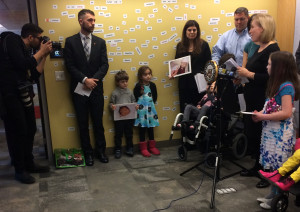EFMNY Joins Senators Gillibrand & Booker in Support of CARERS Act
“It was such a privilege to gather with New York & New Jersey families in NYC in support of the #CARERSAct legislation sponsored by Senator Kirsten Gillibrand, Senator Cory Booker, and Senator Rand Paul, which aims to reschedule cannabis to facilitate epilepsy research. The CARERS Act Bill will provide access to research, enabling families and their physicians to chose treatment options without fear of being in violation of federal law. It provides hope in the battle against seizures and we are deeply grateful to the bills sponsors.”
-Statement from Executive Director Pamela Conford of the Epilepsy Foundation of Metropolitan New York (EFMNY)

Senator Kirsten Gillibrand w/ NYC epilepsy advocate Paula Notari, mother of baby Emma Rose Mazurek, speaking to NY/ NJ families about the CARERS Act to Reschedule Cannabis
For full information on epilepsy and the CARERS Act, please read our blog post: http://epilepsynyc.com/2015/03/epilepsy-carers-act-reschedule-cannabis-marijuana-explained/

EFMNY Exc. Director Pamela and Senator Cory Booker in NYC supporting the #CARERSAct
My Life With Epilepsy
Dear EpilepsyNYC Community,
I am Kate Spratt. I am 28 years old, and I have epilepsy.
When I was six years old, I had my first seizure: on Christmas Eve, I was looking at the twinkling lights on our Christmas tree and my Grandma was talking to me but I wasn’t responding, I just kept looking at the lights.
However, I don’t remember this. All I remember is waking up in the hospital and being very confused. Worried that I was going to miss out on Christmas, I spent that night in the hospital having multiple tests and a spinal tap done. After that, for the next five years of my life, I was seizure free.
Then suddenly, when I was eleven, I had three grand-mal seizures and I was put on medication. During my pre-teen and teenage years, my seizures were under control (for the most part). I did have some “jerks,” but they didn’t affect me enough to debilitate me. I went to school, hung out with my friends, and participated in after school activities. I am grateful for that. I didn’t really talk about my epilepsy when I was a teenager, only a few of my close friends knew. Looking back, I think I didn’t tell people because I wasn’t sure how they would react.
Then, when I was around sixteen, I was in class one day, about to take a test, and I had a seizure. Next thing I knew, I was on my side, on the floor, and the ambulance was there. Luckily, my teacher at the time, used to work with children who had epilepsy and knew what to do when a student had a seizure. I had never had a seizure in school before. I was very tired (as I usually am after a seizure), but mostly very embarrassed. I swore I wouldn’t go back to school.
That night, the teacher called my house and spoke with my mom. She wanted to see how I was doing, and knowing I was probably embarrassed, also wanted me to know that everyone was very concerned about me. When my mom told me, I was relieved, but still kind of nervous of how people would react. Upon my return to school, no one said anything. When one girl shyly asked if I was feeling better I realized people were concerned. It was time to tell my friends, all my friends. Because seizures can happen, anywhere at any time, and people should know what to do.
Opening up about my epilepsy made my classmates comfortable enough to open up to me. I realized that a lot of people had family-members who had it too, while others, who were not familiar with epilepsy, wanted to know more. I knew then it wasn’t something to be embarrassed about; it was just a part of me. I think of it like this: some people have allergies, some people have asthma, and some people have epilepsy.
I proceeded to go to college and graduated with a Bachelor of Science in Secondary Education, with a 3.15 GPA and in four years. I did miss days sometimes because I had seizures and couldn’t go to school. I once even fell down the stairs on campus because I just kept walking and couldn’t stop. Graduating college was a huge accomplishment for me, because of how challenging it was at times. I couldn’t pull “all-nighters” like other students, and the workload could be quite stressful.
After graduating from college, I found a job that I loved at an after school program. On May 18, 2009, while I was taking a shower to get ready for work, I reached over, simply to adjust the water temperature slightly, and had a seizure, which caused me to accidentally turn the hot water on all the way and fall down. I don’t know how long I was under the scalding hot water and when I re-gained consciousness I didn’t even realize I was burnt; it was like I was in a fog. Twenty percent of my body was scalded and I had third degree burns. My whole back, my left arm and my thumb were burnt. I was in the hospital for five weeks. They said if I had passed out face forward I would have died. I had three skin grafts, I couldn’t walk, I couldn’t bend down, and I didn’t have range of motion in my arm for months. I had to wear compression garments for a year and do months and months of physical therapy in the hospital and everyday at home with my dad.
Ever since 2009 my epilepsy has gotten worse; the doctors don’t know why this is or why I even have epilepsy. No one in my family has ever had it, I never ran fevers as a child, or had any head injuries. I’ve been hospitalized numerous times and endured all sorts of different side effects brought on by my medications. I’ve been on so many different medications it feels like I’ve been on every AED out there.
I have my ups and downs with my epilepsy. I try to stay strong or say that I’m a medical mystery, since no one knows why or how my epilepsy has gotten worse. It’s always great when you take a few steps forward but such a defeat when you then take those steps back. Because of everything that has happened, especially in the past few years, people don’t understand how I’m an optimist. When it comes down to it, it would probably be easier to be a pessimist, but it’s important to appreciate the good things in your life, like your family and friends, the moments when you’re not having seizures, and most of all, the fact that I’ll never give up hope for that one day when I’ll stop being a medical mystery.
Q&A with Patricia McGoldrick, NP, MPA, MSN
NEXT UP: Our 1st Community Spotlight featuring Team Gabriella & The Epilepsy Road Warriors
The team at EFMNY would like to thank you for your questions! After each post, we’ll post answers from our experts to the most frequently asked questions we receive. Please note that these Q&A post, like our provider articles, should not be taken as medical advice. Each patient is unique. For medical advice regarding your specific condition, please consult your doctor.
Q&A with Patricia McGoldrick, NP, MPA, MSN:
1. I just found out that one of the medications I’ve taken for years is available in generic form. If it’s only one of the two medications I take, is there less risk in trying the generic?
This is difficult to answer without knowing which medications you are taking. Some of the medications in generic form are made by the same companies that make the brand name medications and so are consistent. The answer depends on the medications, the doses, how long you have been seizure free and a host of other issues. Please ask your provider, as he or she knows you best!
2. My daughter had surgery earlier this year. We were hoping that she would be medication free. However, she is still on meds. Is this typical for kids who have had epilepsy surgery?
The type of surgery, the medications, the length of time after the surgery and the cause of the epilepsy must all be taken into consideration, as well as the EEG findings and the post-operative MRI findings. Typically, medications are considered for some period of time after the surgery. Again, this is a great question for your provider! (more…)
Switching Seizure Medications: Part II
How soon should medications be changed?
The typical rule of thumb is that medications should be switched if they are ineffective. Once a person has been on the appropriate medication for their type of seizures, and has reached the appropriate or maximum dose and is still having seizures, the medication should be changed. Usually a second medication is added and then “titrated up” (that is adjusted in a step-wise progression) until seizure control is reached or the maximum dose of the second medication is achieved. If seizures are under control, consideration should be given to weaning the first medication. Having said that, there are often instances when seizure control is reached with two medications used in combination and the person with epilepsy remains on two medications. The risk of seizures and injury must be weighed against the risk of side effects.
Should medications be changed if there are side effects?
The important thing to remember about side effects is that they MAY occur, not that they will! Medications are tested in clinical trials in large groups of persons. Every event that occurs during the time of the trial is reported as a side effect, even if the event occurs only in one or two persons and is not conclusively determined to be a direct effect of the medication.
Often side effects occur when the medication is first initiated and may lessen or resolve over time as the person’s body “becomes used to the medication.” A prime example is the side effect of drowsiness that occurs with oxcarbazepine and usually resolves within a week or two. Another is the abdominal upset that can occur with ethosuximide and is managed by eating before the medication is taken. On the other hand, intolerable side effects should result in changes of medications. (more…)
Q&A with Dr. Fred Lado
NEXT UP: Part II of “Switching Seizure Medications”
by Patricia McGoldrick, NP, MPA, MSN
The team at EFMNY would like to thank you for your questions! After each post, we’ll post answers from our experts to the most frequently asked questions we receive. Please note that these Q&A post, like our provider articles, should not be taken as medical advice. Each patient is unique. For medical advice regarding your specific condition, please consult your doctor.
Q&A with Dr. Fred Lado:
1. I lost my driver’s license due to seizures. If I switch medications or add a new medication, how long will it take to demonstrate that I can drive? Is the decision up to my doctor or the State?
The rules that govern whether and when an individual may drive are set by each state (Click HERE for more information). In New York State, individuals are required to be seizure free for 12 months before they may drive. If a seizure occurred because an individual reduced a medication on the orders of a doctor, it may be possible to resume driving sooner (after receiving approval of the NY Dept. of Motor Vehicles). Switching medications does not alter the time an individual may not drive.
2. I am now on two medications, and I’ve been doing better. I still have seizures every 3 or 4 weeks. Is it risky to add a third medication at this point?
The biggest improvement in seizure control usually occurs after starting the first medication. The second medication will also usually make a noticable difference in seizure control. The third medication may also help, but less than the first two. Taking more than three medications is unlikely to improve seizure control, but may increase side-effects. The chance of side-effects, particularly drowsiness, increases with each added medication. Most side-effects are reversible, meaning they will go away after reducing or stopping the new medication. There is always a chance of rare side-effects when starting a new medication, but one has to balance the risk of further seizures against the low risk of a rare side-effect. (more…)
Q&A with Ruth Shinnar, RN, MSN
NEXT UP: Part I of “Switching Seizure Medications”
by Dr. Fred Lado
The team at EFMNY would like to thank you for your questions! After each post, we’ll post answers from our experts to the most frequently asked questions we receive. Please note that these Q&A post, like our provider articles, should not be taken as medical advice. Each patient is unique. For medical advice regarding your specific condition, please consult your doctor.
Q&A with Ruth Shinnar, RN, MSN:
1. I’ve heard that switching between brand drugs and generics can affect a change in seizure control and patterns. Is that true? Should I be concerned about using generics?
Switching between brand drugs and generics usually does not have an effect on seizure control. Unfortunately, there is no way to determine who will be affected by switching. The Federal Drug Administration (FDA) has set manufacturing guidelines for makers of generic drugs. The generic drug manufacturer must prove its drug is the same as (bioequivalent) the brand name drug. When a drug, generic or brand name, is mass-produced, very small variations in purity, size, strength, and other parameters are permitted. FDA limits how much variability is acceptable. Most people will not be affected by this variability but some are. If you are one of these people you can be prescribed the brand name and provide evidence of need to your insurance company with the help of your health care provider.
2. My daughter has experienced significant weight gain since she started taking seizure meds. While we recognize her concern, my husband and I are afraid that switching her medications will trigger more seizures. Do you have any recommendations for teens with epilepsy who have weight issues?
Healthy eating habits and regular exercise are encouraged for everyone but medications can cause weight gain even when eating healthy. If the weight gain is felt to be from the antiepileptic medication a change may be beneficial. There are ways to safely switch over to another medication and you can discuss how to do this with your daughter’s health care provider.
3. Although my seizures are well controlled with my medication, I do get headaches more often that I used to. Is this typical? Should I talk to my doctor?
Headaches can be a side effect from antiepileptic medications, although it is uncommon. Your neurologist can perform a headache evaluation and should be able to determine whether your medication should be changed. (more…)

